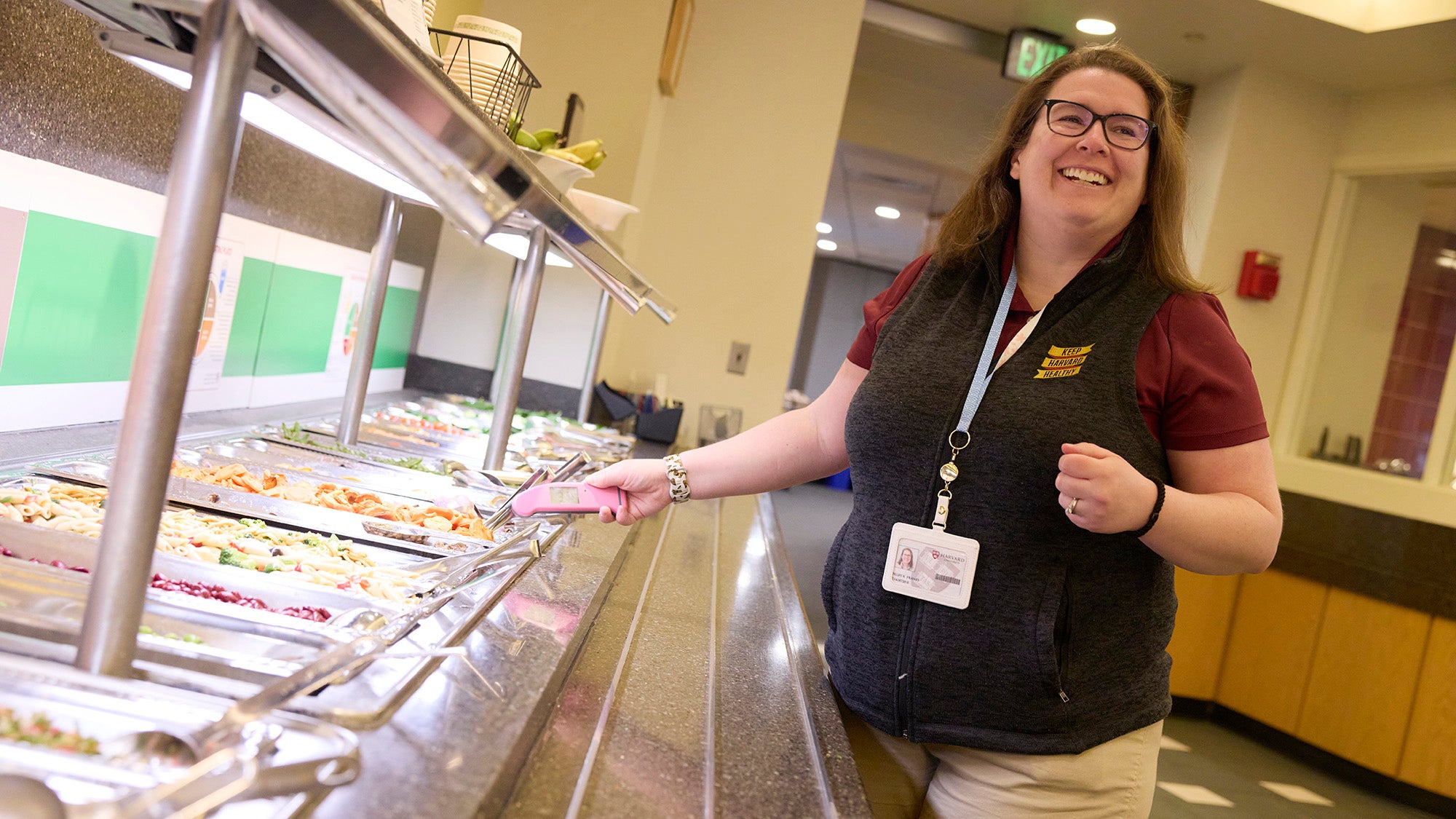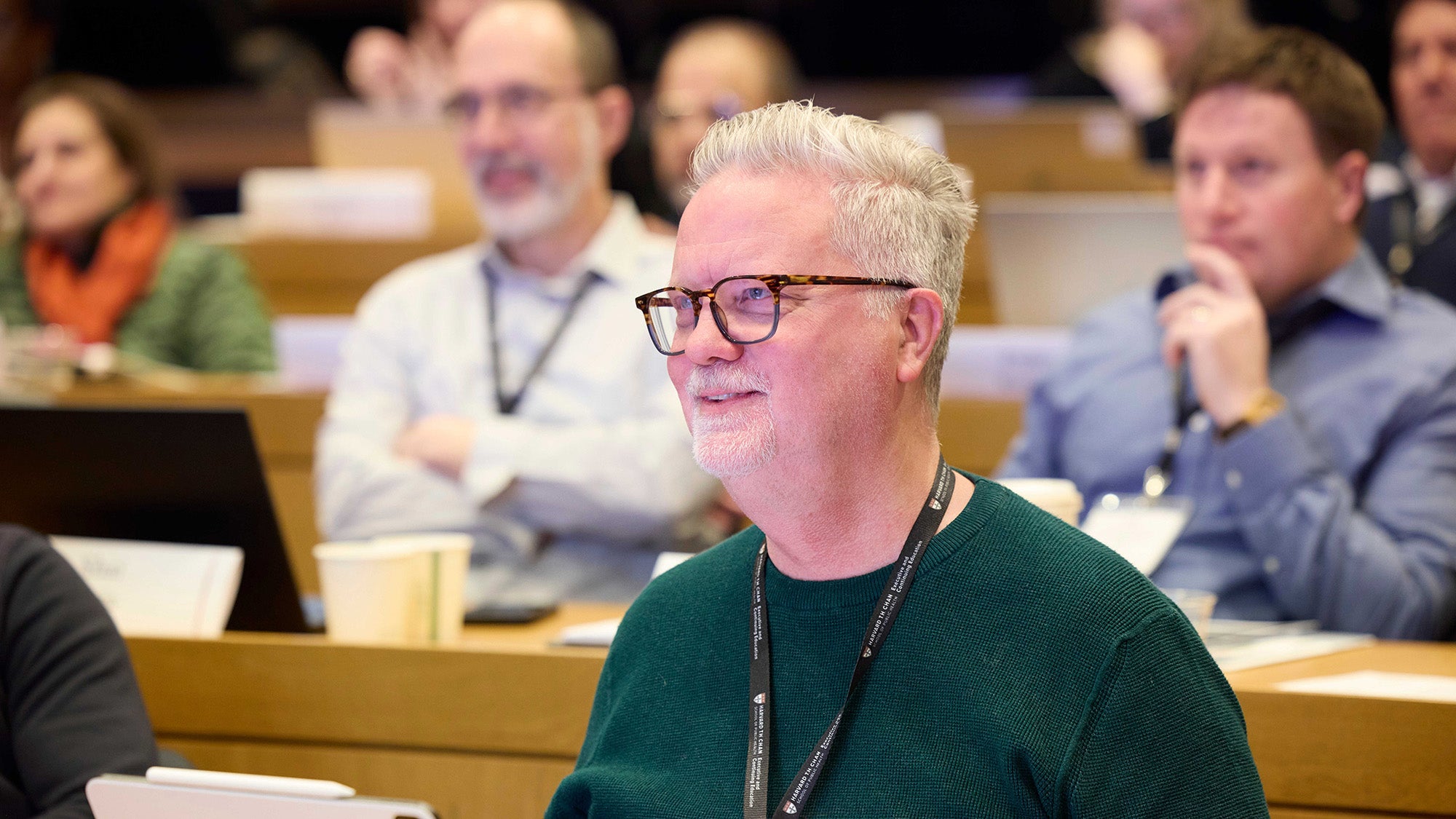Gaining epidemiological skills to make campus healthier

Marykate Kenney, MPH ’25, is bringing new skills to her role as an environmental public health officer at Harvard
It was in a college food microbiology class at Colorado State University that Marykate Kenney fell in love with public health.
The class got her thinking, she said, about the “tiny details that impact people’s lives, and how differences in regulations can positively or negatively impact thousands of people.”
Then, in 2011 and while Kenney was still a student, there was a deadly listeria outbreak linked to contaminated cantaloupe from a farm in Colorado that killed 33 people and sickened 147 across the U.S. “That deeply resonated with me,” she said.
After earning her bachelor of science in environmental health in 2013, she worked for several years for local health departments in Colorado, then for the state health department. During a stint at the Tri-County Health Department in Aurora, she worked with epidemiologists to investigate foodborne illnesses, rabies, measles, Legionnaire’s disease, West Nile virus, and more. The experience got her interested in epidemiology.
“They taught me how to conduct investigation interviews, how to be thorough and consider every detail,” she said. “For example, conducting a foodborne illness outbreak investigation requires analyzing records, hygiene habits, and site conditions to try to unravel what may have happened.” When there was a measles exposure in the Denver metro area in 2016, “The epi team trained us to carefully communicate with families exposed to the measles case, getting details about vaccination history and their activity to ensure that the disease did not spread further,” Kenney recalled. “It was a slow, methodical, and emotionally charged process—but rewarding.”
She added, “I find epidemiology to be a fascinating juxtaposition between analytics and understanding human behavior. Epidemiologists conducting investigations need to have active listening skills so they can get the necessary case information, be knowledgeable enough to answer a person’s questions, and be able to create a comfortable environment to discuss sensitive topics.”
In 2019, Kenney landed a job as an environmental public health officer at Harvard University, and in 2023 became a student in Harvard T.H. Chan School of Public Health’s part-time, predominantly online Master of Public Health in Epidemiology (MPH-EPI) program to further her epidemiological training. She’s slated to graduate this month.
Learning while working
In her current role at Harvard, Kenney works on preventing communicable diseases and gastrointestinal illnesses, and keeping drinking water, food, and swimming pools safe. Sometimes she responds to calls about wildlife, particularly in the spring, when coyote pups and turkey poults are roaming about and their parents are on high alert. She’s even had to rescue turkey poults from window wells—where they sometimes get stuck—while keeping an eye out for protective mothers.
Rodents, prevalent across Boston, are an ongoing problem for Kenney and her colleagues. She has already used the epidemiological skills she’s gained in the MPH-EPI program to help design a year-long study, in collaboration with the cities of Cambridge and Somerville, to learn whether rat birth control products will help lower their rat populations.
For her practicum project, Kenney is focusing on food safety and language equity. Noting that restaurants statistically have more non-English speaking workers than other industries, she said she wants to know: “If we have a kitchen full of individuals who don’t speak English, and we have materials about food safety only in English, could that be a safety issue?” To find out, she is looking at data from the Centers for Disease Control and Protection on roughly 1,200 outbreaks of foodborne illness that occurred in the U.S. between 2014 and 2020, to see whether the food establishments where the outbreaks happened provided food safety materials in languages spoken by their workers.
January in Japan
A highlight of Kenney’s Harvard Chan experience was a winter session trip to Japan, led by Aya Goto, Taro Takemi Professor of the Practice of International Community Health, to Fukushima Prefecture in Japan. Kenney and 14 graduate students from across Harvard went on the trip, which focused on the experiences of people who lived through the triple disasters of March 2011—an earthquake, tsunami, and Fukushima nuclear reactor accident—and communities’ revitalization efforts. Part of the students’ task was to examine how Japan can increase resiliency, both in physical infrastructure and in the population.
“One of the biggest takeaways for me was how, after an acute emergency such as an earthquake, fire, or tornado, the public health ramifications can go on for months [or years],” said Kenney. She noted, for example, that Japan still hasn’t figured out what to do with radioactive contaminants released into the environment near the nuclear plant.
Impressive faculty, classmates
Kenney said she was intimidated when she started at Harvard Chan School. “Imposter syndrome is real at Harvard,” Kenney said. “It’s easy to put people on pedestals … and to think students and instructors aren’t going to be able to make time for you.” But, she continued, “They will—everyone is happy to help.”
For instance, Kenney thinks that “everyone [in the MPH-EPI cohort] would stop traffic” for Pamela Rist, associate professor in the Department of Epidemiology, and Brian Healy, associate professor in the Department of Biostatistics, who taught foundations of epidemiology and how to use STATA, a statistical software package for analyzing and visualizing data. “And Heather Baer [associate professor in the Department of Epidemiology] is so enthusiastic, which really energizes students,” Kenney said.
Although her program is mostly online, Kenney has gotten involved in campus life as an MPH-EPI program representative in the Harvard Chan Student Government Association, where she’s helping to develop a student guide to Harvard and Boston.
The fellow students in her cohort have been wonderful, she said. “A lot of them are PhDs and doctors and seriously talented, smart people,” she said. “When I started I was a little worried, I won’t lie to you—I was thinking, ‘Oh my gosh, all I have is a bachelor’s degree, will I be able to keep up?’ But they’ve all been so nice and it’s been great working together and getting to know them.”


